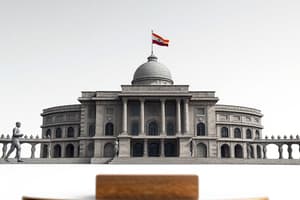Podcast
Questions and Answers
What is the ultimate legal document in India?
What is the ultimate legal document in India?
The Constitution of India
Which of the following is a feature of the Constitution of India? (Select all that apply)
Which of the following is a feature of the Constitution of India? (Select all that apply)
- Universal adult suffrage (correct)
- Emergency provisions (correct)
- Establishment of a monarchy
- Guidelines for individual rights (correct)
The Constitution of India provides for multiple citizenships.
The Constitution of India provides for multiple citizenships.
False (B)
What are the Fundamental Duties outlined in the Constitution of India?
What are the Fundamental Duties outlined in the Constitution of India?
What does the Preamble of the Constitution of India express?
What does the Preamble of the Constitution of India express?
The division of powers among the legislative, executive, and judicial branches is known as ______.
The division of powers among the legislative, executive, and judicial branches is known as ______.
Match the following features of the Constitution with their descriptions:
Match the following features of the Constitution with their descriptions:
What is the role of judicial review in the Constitution of India?
What is the role of judicial review in the Constitution of India?
Flashcards are hidden until you start studying
Study Notes
The Constitution of India
-
The Constitution of India is the ultimate legal document in India, establishing the framework for government at both the federal and state levels. Any laws or actions inconsistent with it are deemed invalid.
-
The Constitution outlines fundamental rights, including equality, freedom, and justice, ensuring protection for all citizens. It also includes Directive Principles that guide the state in creating laws and policies for social and economic justice.
-
The Constitution of India promotes the rule of law, democracy, federalism, protection of rights, social justice, economic development, national unity, and judicial review. It also allows for amendments to adapt to changing times and needs.
Salient Features of the Indian Constitution
-
The Indian Constitution is one of the longest in the world, with 448 articles, 25 parts, 12 schedules, and numerous amendments.
-
The Preamble defines the guiding principles, including Justice, Liberty, Equality, and Fraternity, declaring India a Sovereign, Socialist, Secular, Democratic Republic.
-
Sovereign, Socialist, Secular, Democratic Republic: India is an independent nation free from external control, pursuing social and economic equality. It respects all religions and prioritizes democracy, where power resides with the people. It is a republic with an elected head of state.
-
Parliamentary System of Government: The government operates on a system of the central and state governments with a clear division of powers and the executive being responsible to the legislature.
-
Federal System with Unitary Bias: India has a federal structure, but the central government has significant power. The central government assumes greater power in times of emergency.
-
Separation of Powers: Power is divided into the legislative, executive, and judicial branches to prevent power concentration and ensure a system of checks and balances.
-
Fundamental Rights: These rights guarantee equality, freedom, protection from exploitation, religious freedom, cultural and educational rights, and constitutional remedies.
-
Directive Principles of State Policy: These provide guidelines for the government in implementing laws and policies to achieve social and economic democracy.
-
Fundamental Duties: These outline the responsibilities expected of every citizen to promote national responsibility.
-
Independent Judiciary: The strong and independent judicial system, led by the Supreme Court, ensures the rule of law and safeguards the Constitution.
-
Universal Adult Suffrage: Every citizen above 18 years old has the right to vote, regardless of caste, religion, or gender.
-
Single Citizenship: Unlike other federal systems, India has single citizenship to promote unity and integrity.
-
Integrated Judicial System: India has a centralized court system with the Supreme Court at the top, covering both the Union and states.
-
Emergency Provisions: Special provisions are in place to address national crisis, including national emergency, state emergency (President's rule), and financial emergency.
-
Amend ability: The Constitution balances rigidity and flexibility, allowing for amendments to adapt to needs while ensuring certain crucial provisions require special procedures for modification.
Studying That Suits You
Use AI to generate personalized quizzes and flashcards to suit your learning preferences.




